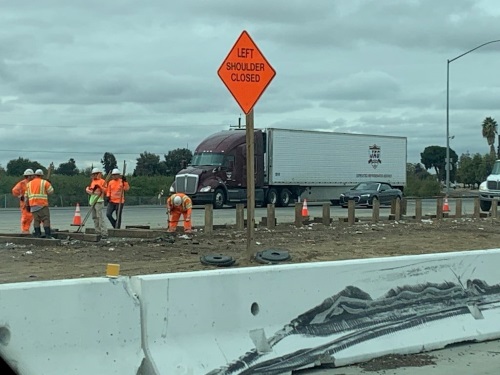On the heels of an executive order by California Governor Gavin Newsom (D) to help tackle state-level supply chain issues, California and the U.S. Department of Transportation formed a strategic federal-state partnership to finance infrastructure projects that create “sustainable solutions” to improve freight movement.
[Above photo by Caltrans]
The governor said in a statement that the agreement allows California to expedite work on a network of related projects – rather than using a piecemeal approach – that collectively protects the environment, facilitates the movement of imports and exports, and improves the resilience of critical trade corridors within California and for the United States.

“California’s ports and infrastructure system is key to the country’s supply chain,” Gov. Newsom said.
“This innovative federal-state partnership will help us fast-track those projects that will make our ports and infrastructure even more efficient,” he added. “This partnership will help us jumpstart and support multiple infrastructure projects to improve our supply chain, making sure goods get to where they need to go faster, cheaper, and in a more environmentally-friendly manner.”
Projects that could receive support through this agreement include:
- Port-specific upgrades;
- Expanding capacity for freight rail;
- Developing inland port facilities for increased warehouse storage;
- Railyard and truck electrification;
- Highway upgrades to improve truck travel times;
- Grade-separated crossings to reduce the number of rail-street intersections and improve safety and efficiency;
- Land ports of entry to expand trade capacity and cross-border commerce;
- Other eligible projects identified by the California State Transportation Agency or CalSTA.
“The COVID-19 pandemic put a spotlight on California’s ports and the importance of our state’s infrastructure in moving goods throughout the U.S. and around the world,” CalSTA Secretary David Kim said.

“[This] agreement will go a long way toward quickly upgrading infrastructure to support a more efficient and resilient supply chain that will flex California’s power in global trade,” he added.
He noted that California’s recently enacted budget includes $250 million for ports, $280 million for infrastructure projects at and around the Port of Oakland, and $1.3 billion over three years for zero-emission trucks, transit buses and school buses, including the deployment of more than 1,000 zero-emission port drayage trucks.
 States
States
TxDOT Updates Artificial Intelligence Strategic Plan
February 27, 2026 States
States

